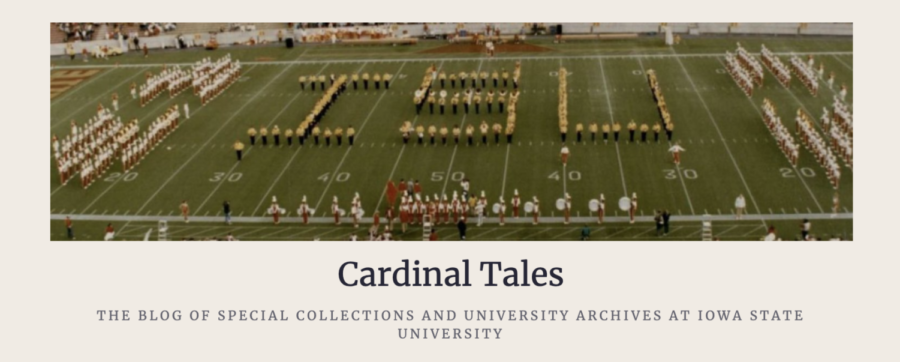Students share stories through University Library blog
Cardinal Tales is a blog created by Special Collections and University Archives to share Iowa State history and connect with the community.
April 20, 2020
The Iowa State University Library has started a series of blog posts called “Tell Your Story” where students share their stories while away from campus amid the coronavirus pandemic.
Daniel Hartwig, head of special collections and university archives, said in an email planning for the series started during the transition to remote work. A survey was sent to library student employees March 23 and project rosters finalized March 30. The first post was published April 8.
“With most of the campus closed down to help promote social distancing, many students have also seen their opportunities to work jobs on campus limited,” according to a post on Cardinal Tales by university archivist Greg Bailey. “In the library, we have looked to find ways to help these students continue to work from home, as some are in need of this income.”
These blog posts are published on the blog called “Cardinal Tales,” which is the blog of Special Collections and University Archives at Iowa State. Hartwig said the purpose of Cardinal Tales, which was started in 2010, is communications, outreach, news and engagement with the community.
“One of the projects that I am overseeing is having students journal their experiences during these challenging times,” Bailey said in a post on Cardinal Tales. “We will be sharing those experiences here on Cardinal Tales, while also uploading them into the ISU Digital Repository for long-term access, thanks to the students who have agreed to participate.”
These posts are written by students, and only minor grammatical edits are made before they are published.
Hartwig said in an email there are guidelines to help the student employees craft their stories.
“Student experiences are a part of our collecting scope, and this worldwide pandemic has touched us all in some way,” Hartwig said in an email. “As students, we would like to gain your experience, perspective and thought on what is going on, how it has affected you and your life as a student at ISU (your education, involvement in organizations, social life, job).”
The blog posts created by the students generally include them “writing up their thoughts and experiences” along with a photo. Sometimes it includes a video post or vlog, which consists of them sharing their thoughts in a recorded video.
So far, the series has highlighted the story of seven Iowa State students, all of whom are employees of Parks Library.
The first was by Taylor Tomlinson, a College of Liberal Arts and Sciences open option sophomore.
The second was by Deshonna Garth, a junior in early childhood education.
The third was by Jaclyn Fraise, a junior in apparel, merchandising and design.
The fourth was by Mimi Duong, a senior in finance.
The fifth was by Natalie Kelly, a senior in event management.
The sixth was by Adriana Chew, a senior in culinary food science.
The seventh was by Mason Porter, a sophomore in history.
Special Collections and University Archives also announced on Monday the creation of the “ISU COVID-19 Stories Project.”
“We are pleased to launch the ISU COVID-19 Stories Project to document and preserve the ISU communities’ experiences of the COVID-19 pandemic,” Hartwig said in a post on Cardinal Tales. “ ISU students, faculty, staff and community members are invited to share their experiences and thoughts during this unprecedented time. All stories are welcome.”
Special Collections and University Archives will gather these materials and create a digital collection as a contribution to the historical documentation of these events.
“We are in the midst of a unique historical event. In the future, scholars will look back on this time to learn about individuals’ and societies’ responses to a worldwide pandemic,” according to the Special Collections and University Archives website. “While archived news and internet sites will be essential primary sources, the day-to-day, social and emotional experiences of individuals can get lost in the fray.”
How to participate
The Special Collections and University Archives website said the best way to start documenting an experience for the University Archives is in a Google Doc or Microsoft Word document.
“Stories can take any form — you can jot down short thoughts or stream of consciousness, craft longer essays or poems, take photos for a photo essay, create audio and video recordings or sign up to be interviewed for an oral history,” according to the Special Collections and University Archives website.
The website stated important information for historians will include times and dates of events, observations and entries, names of geographic locations, organizations, people and/or other factual information that provides context to a person’s story.
The Special Collections and University Archives website also included a list of prompts to help stimulate people’s thoughts.
Questions can be directed to [email protected].

















